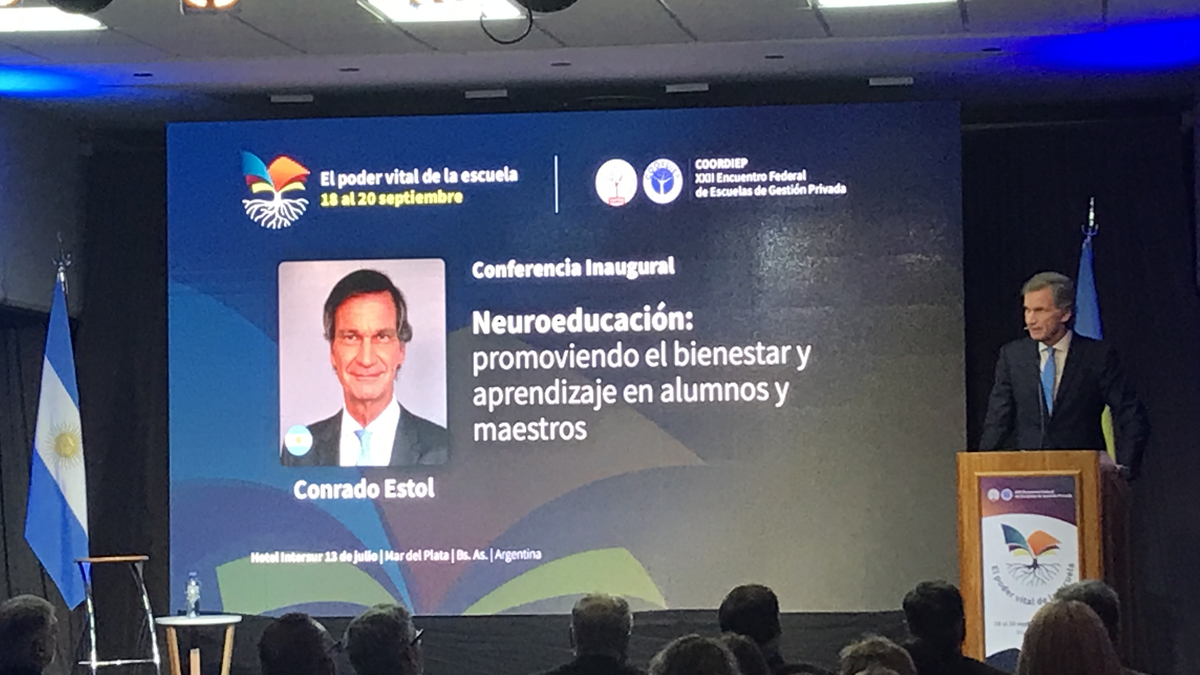Estol started from a very pessimistic diagnosis of the current situation of education and educational trainers. Two of his rhetorical questions reveal this: “Who among you is convinced that your child is receiving an ideal education? Do you believe that because you pay a high price, your child is getting an ideal education?”
“Luciano Román, who I love to read, wrote an article in which he talked about Mafalda, that girl who was born in 1958, in a middle-class family. Today I would probably be living on a plan, in an unsafe neighborhood. The same thing happened to education. Teacher training was degraded, and schools stripped away honor rolls to begin the process of equalizing downwards, which fought against excellence.” The concern in the main auditorium of the Intersur 13 de Julio Hotel of Luz y Fuerza was total.
Conrado completed his medical training as a resident in clinical medicine in New York and his neurology training at the University of Pittsburgh in Pennsylvania. But he and his 93-year-old father are Argentines. He knows perfectly well what is happening today. And, as a good meritocrat who embraces intelligence and effort, what he sees in Argentine education does not satisfy him. “It seems that we have created a perfect cocktail for mediocrity. A survey was conducted among Argentine leaders and only 3% believed that education was important”he warned. Even the Martín Fierro awards fell apart, according to Estol. “Originally, there were 50 awards before, but I think that in the last edition 500 were awarded. Everyone has to have an award, we do not tolerate failure, which in some way is the basis of success, and the training of teachers must be strict, as it is in medicine.” Estol speaks and the faces of the attendees begin to transform.
Before moving on to the mind-blowing advice for better education, the doctor and researcher also recalled that in the US doctors are trained with an absolute and exclusive education of many hours; he advocated for a greater professionalization of school directors and a robust system of financing of educational teams; but he clarified that more budget for education does not imply better results for students, and that increasing research in science is useless if the number of patents does not increase, if publications are not published. “Is it an investment or an expense?”he wondered.
Conrado is an excellent speaker. He connects ideas one after another, like links in an unbreakable chain. The conference participants follow him attentively, word by word, slide by slide, like someone listening to a trained teacher. “Artificial intelligence is a fabulous thing, it is nothing more than that,” he says when taking up the challenge of technology in education. “It will soon be in schools. Imagine virtual reality with artificial intelligence, an incredible thing. Imagine an avatar of Plato in a classroom, speaking from Ancient Greece, teaching philosophy. I find it more attractive than what we have had so far. But beware: You are going to have to do something to create seat belts, speed limits and airbags for artificial intelligence”And for Estol this is no joke: the apocalyptic Yuval Noah Harari cited in his latest book a panel of 2,000 experts of whom 30% said that there is a 10% chance that artificial intelligence will extinguish the human race. “Artificial intelligence is not a tool. It is not a technology. It is a manager who makes decisions.”
Entering the world of neurons, he stated that intelligence is maintained and can grow throughout life. But it is also easily destroyed. The first three years of life are key to the cognitive development of people, in the stage of formation of the cerebral cortex, of greater reproduction of neurons. But it is also important that this growth is not spoiled during adolescence, with cigarettes and alcohol, for example. Until the age of 25, neurons are generated, what remains, accompanies us for life. And for this reason, the doctor has his prescription: “Do you know what the biggest difference is between a smart person and a smart person? A smart person is the person who finds spectacular solutions to problems that smart people don’t bother with. And do you know what the difference is between knowledge and wisdom? Knowledge is knowing that tomatoes and avocados are fruits. Wisdom is knowing that if I make a fruit salad, I don’t have to put avocado or tomatoes in it.”
In front of an audience with a majority of educators, Estol did not miss the opportunity to leave the role of women in educationits distinctive qualities, and the importance of breaking the glass ceiling. “Women have much more empathy, perspective, sensitivity and a tendency to relate (bond). That is more appropriate (for the classroom). In 2001, a well-known scientific journal decided to talk about which countries handled the pandemic best. And the countries were New Zealand, Denmark, Germany, Norway, Iceland and Taiwan. All countries with female prime ministers or presidents.” And if we are talking about money, Estol also denounced that women earn less all over the planet. “Men choose higher-paying jobs, such as engineer, doctor, lawyer, and CEO. Women choose lower-paying jobs, such as female engineer, female doctor, female lawyer, and female CEO.”
Conrado Estol’s advice for improving education
Throughout the conference, Estol cited and recalled dozens of scientific studies and precise medical research. From all these works presented globally and endorsed by the international medical community, plus a set of ideas that emerge from famous authors of all times, the following advice can be highlighted for both students and educators.
- Perform at least 7 minutes of exercise daily. To allow for adequate rest, they may go out for recess earlier.
- Classes should start at 9 a.m. Students do not have adequate attention when they arrive at school if they get up at 7 a.m.
- Students should get 9-10 hours of sleep per night and avoid going to bed at 1 a.m.
- Cell phones in the classroom are a distraction. Think of ways to reduce their use at school
- Teach students to eat properly, prioritizing a plant-based diet.
- Increase dental check-ups for children. Poor oral health and lack of hygiene increase the risk of cardiac arrest.
- Avoid substances that degenerate neurons and affect intelligence. Young people should not smoke a single cigarette or consume alcohol.
In the case of advice for school principals, administrators and teachers, this was the best selection of quotes from Estol, with ideas to put into practice in schools.
“We have to record what we do, record the data, measure. We only control what we experience, and everything is measurable. We never want to measure so as not to encounter failure, it is anti-meritocracy.”
“We must not leave any child behind, we must help them all. We must also identify and support those who find it most difficult to help, but also those who stand out the most, those who will probably do the most to change the country.”
“When there is less poverty, there is more education and better health. But obviously we also have to change the teaching methodology. Jefferson, one of the founding fathers of the United States, said in the 18th century that an adult cannot wear the coat that fit him as a child. He has grown up. Things have changed. My coat has to change.”
“As Sarmiento said, we must always teach. Teach in the playground and on the street as well as in the classroom. Teach with attitude, with gestures and with words.”
At the end of the conference, the neuroscientist received the expected applause, honors and congratulations. The audience was amazed, in a state of pure reflection. Most of them were moved by his presentation. Dozens of participants waited for him to take a photo. In return, he left his final recommendation.
“Author Robert Fulton maintained: Everything I ever needed in life I learned in kindergarten. The wisdom was in the sandbox. Leave things where I caught them, don’t hit people, say thank you, say sorry, have a glass of milk, the basics. I would tell them that in my case, all I did was do my homework. That’s what I told my children. You have to do your homework in life. There is no other option. Do your homework.”
Source: Ambito
I am a 24-year-old writer and journalist who has been working in the news industry for the past two years. I write primarily about market news, so if you’re looking for insights into what’s going on in the stock market or economic indicators, you’ve come to the right place. I also dabble in writing articles on lifestyle trends and pop culture news.




